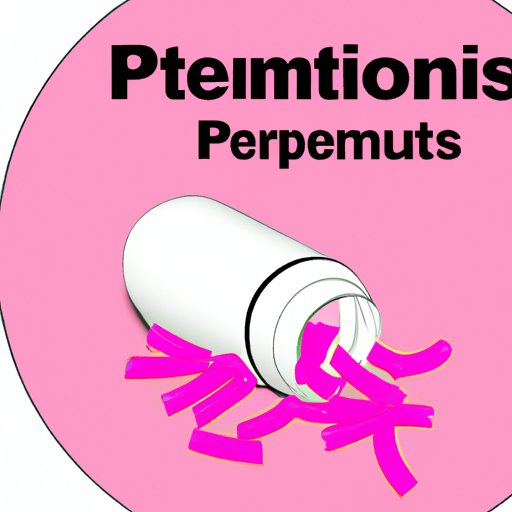
Introduction
Pepto and Tums are both popular over-the-counter medications used to treat various digestive conditions, such as heartburn, acid reflux, and stomach upset. While they work differently, some people may wonder whether it’s safe to take them together. This article aims to provide a detailed answer to this question and guide you through the potential risks and benefits of combining Pepto and Tums.
Understanding the Differences Between Pepto and Tums, and Determining If They Can be Taken Together
Pepto-Bismol, the brand name of bismuth subsalicylate, is an antacid and anti-diarrheal medication that works by coating the stomach lining, reducing inflammation, and absorbing excess fluids in the intestines. Tums, on the other hand, is an antacid containing calcium carbonate that neutralizes stomach acid and reduces symptoms of heartburn and indigestion. Both medications are available in various forms and flavors, such as tablets, chewables, and liquids.
While Pepto and Tums serve similar purposes, there are some differences to keep in mind. For instance, Pepto is more effective at treating diarrhea and nausea, while Tums is better at alleviating heartburn and sour stomach. Additionally, Pepto contains salicylates, which can interact with blood thinners and increase the risk of bleeding. Tums, on the other hand, may cause rebound acid production, kidney stones, and constipation, especially if taken in high doses or for prolonged periods.
But can you take Pepto and Tums together? The short answer is yes, but there are some things to consider. Both medications can reduce the acidity of the stomach and interfere with each other’s absorption, making them less effective. Moreover, taking too much of these medications can lead to serious side effects, such as vomiting, black stools, and dizziness. Therefore, it’s essential to follow your doctor’s or pharmacist’s advice and not exceed the recommended dosages or duration of use.
Mixing Pepto and Tums: Here’s What You Need to Know
If you’re considering taking Pepto and Tums together, it’s crucial to understand how they can affect each other in the body. Pepto can slow down the absorption of Tums, and vice versa, which can delay symptom relief and reduce their overall effectiveness. Additionally, Pepto can cause constipation, which can worsen if you take Tums, as calcium carbonate can also lead to bowel problems in some people.
Moreover, mixing Pepto and Tums can increase your risk of side effects, such as nausea, bloating, and stomach cramps. In rare cases, it can also lead to toxicity or overdose, especially if you’re taking other medications or have underlying medical conditions. Therefore, it’s essential to talk to your doctor or a pharmacist before taking Pepto and Tums together, as they can help you weigh the benefits and risks and choose the best treatment plan for your situation.
In some cases, it may be necessary to mix Pepto and Tums, such as when you have both heartburn and diarrhea, or when you need to treat multiple symptoms simultaneously. In such cases, it’s recommended to space out the doses and take them at least 2-4 hours apart to minimize the risk of interactions and maximize the benefits. It’s also advisable to start with a low dose and gradually increase it if needed or as directed by your healthcare provider.
The Dos and Don’ts of Taking Pepto and Tums at Different Times
If you’re taking Pepto and Tums separately, it’s important to follow some guidelines to avoid potential problems. Firstly, it’s recommended to wait at least 2 hours after taking Pepto before taking Tums, or vice versa. This allows the medications to work independently and reduces the chance of them interfering with each other. Secondly, it’s advisable to take Pepto with a glass of water and avoid lying down immediately afterward, as this can increase the risk of acid reflux and aggravate stomach problems. Thirdly, it’s crucial to read the label and follow the recommended dosages and intervals, as overdosing or double dosing can lead to serious complications.
Exploring the Potential Benefits and Risks of Combining Pepto and Tums
While mixing Pepto and Tums can have some advantages, such as faster and broader symptom relief, it’s essential to be aware of the potential risks and side effects. For example, overusing antacids like Tums can mask underlying conditions, such as ulcers, infections, or cancers, and delay proper diagnosis and treatment. Additionally, Pepto can interact with other medications, such as aspirin, ibuprofen, and antibiotics, and affect their absorption and efficacy.
Therefore, it’s important to use Pepto and Tums judiciously and only for short-term relief of mild to moderate symptoms. If your symptoms persist or worsen, or if you experience other alarming symptoms, such as rectal bleeding, chest pain, or difficulty breathing, you should seek medical attention immediately.
To minimize the risks of mixing Pepto and Tums, you can try some simple tips, such as drinking plenty of water, eating smaller and more frequent meals, avoiding spicy and fatty foods, and reducing stress and anxiety. Moreover, you can consult your doctor or a registered dietitian for personalized dietary and lifestyle recommendations that can help prevent and manage digestive issues more effectively.
Conclusion
Taking Pepto and Tums together can be safe and effective in some situations, but it’s important to understand the differences between the medications, know the potential risks and benefits of mixing them, and follow the dos and don’ts of taking them at different times. While Pepto and Tums can provide temporary relief from digestive symptoms, they are not a cure and should be used sparingly and with caution. To maintain optimal digestive health, it’s essential to adopt a balanced diet, exercise regularly, and seek medical advice if you experience persistent or severe symptoms.





